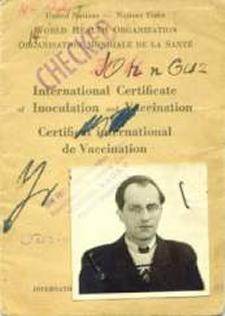|
1. What My Father Ate
He
ate what he couldn’t eat, 
what his mother taught him not to:
brown grass, small chips of wood, the dirt
beneath his gray dark fingernails.
He
ate the leaves off trees. He ate bark.
He ate the flies that tormented
the mules working in the fields.
He ate what would kill a man
in
the normal course of his life:
leather buttons, cloth caps, anything
small enough to get into his mouth.
He ate roots. He ate newspaper.
In
his slow clumsy hunger
he did what the birds did, picked
for oats or corn or any kind of seed
in the dry dung left by the cows.
And
when there was nothing to eat
he’d search the ground for pebbles
and they would loosen his saliva
and he would swallow that.
And the other
men did the same.
2. What a Starving Man Has
He
has his skin. He has a thinness
to his eyes no bread will ever redeem.
He has no belly and his long muscles
stand out in relief as if they’d been flayed.
He
is a bony mule with the hard eyes
one encounters in nightmares or in hell,
and he dreams of cabbage and potatoes
the way a boy dreams of women’s breasts.
They
come uncalled for, round and fevered
like rain that will never stop. There is always
the empty sea in his belly, rising
falling and seeking land, and next to him
there’s
always another starving man who says,
“Help me, Brother. I am dying here.”
3.
Among Sleeping Strangers
The
moon set early and it grew darker,
and the men settled to sleep in the cold
without blankets. Soon it would be spring
but it was still cold, and it was always cold
at
night, and they did what men always did
at night when they were cold. They pressed their bodies
together and looked for warmth the way a man
who has nothing will look, expecting nothing
and
thankful to God for the little he finds,
and the night was long as it always was
and some men crawled roughly across the others
to reach an outside wall to relieve themselves,
and
some men started coughing and the coughing
entered the dreams of some of the other men
and they remembered the agony
of their mothers and grandfathers dying
of
hunger or cholera, their lungs coughed up
in blood-streaked phlegm, and some men dreamt
down deeper and deeper against the cold
till they came somehow to that holy moment
in
the past when they were warm and full
and loved, and the sun in those dreams rose early
and set late and the days were full of church bells
and the early spring flowers that stirred their lives
and
in the morning the man shook away
from the cold bodies of their brothers
and remembered everything they had lost,
their wives and sisters, their lovers, their homes
their
frozen fingers, their fathers, the soil
they’d been born on, the souls they’d been born with,
and then they crawled up out of the earth
and gathered together to work in the dawn.
4. The Germans
These
men belonged to the Germans
the way a mule belonged to the Germans
and the Germans stood watching
their
hunger and then their deaths,
watched them as if they were dead trees
in the wind, and waited for them to fall,
and
some of the men did. They sank
to their knees like children begging
forgiveness for sins they couldn’t recall,
or
they failed to rise when the others did
and were left in the wet gray fields
where the Germans watched them
and
the Germans stood watching
when the men who were still hungry
came back and lifted the dead men
and
carried their thin bones to the barn,
and buried them there before eating the soup
that wouldn’t have kept them alive.
The
Germans knew a starving man
needed more than soup and more than bread
but still they stood and watched.
§§§§
|

